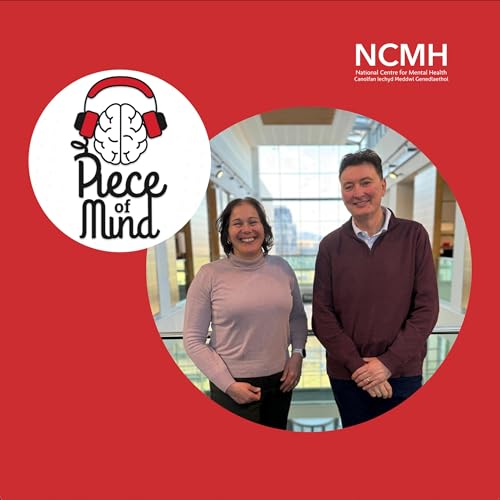
Piece of Mind: Mental Health & Psychiatry
No se pudo agregar al carrito
Add to Cart failed.
Error al Agregar a Lista de Deseos.
Error al eliminar de la lista de deseos.
Error al añadir a tu biblioteca
Error al seguir el podcast
Error al dejar de seguir el podcast
-
Narrado por:
We bring you the latest on mental health research at the National Centre for Mental Health (NCMH) and the Centre for Neuropsychiatric Genetics and Genomics at Cardiff University, plus real-life experiences of people affected by mental health problems.
We would love to hear your feedback or ideas for future episodes, either comment on our latest episode, message us at info@ncmh.info or include #POMpod in our social media posts.
Darn o Feddwl: Iechyd Meddwl a Seiciatreg
Rydym yn rhannu'r diweddaraf ar ymchwil iechyd meddwl yn y Ganolfan Iechyd Meddwl Genedlaethol (NCMH) a'r Ganolfan Geneteg a Genomeg Niwroseiciatrig ym Mhrifysgol Caerdydd, a phrofiadau bywyd go iawn pobl sy'n cael eu heffeithio gan broblemau iechyd meddwl.
Byddem wrth ein bodd yn clywed eich adborth neu syniadau ar gyfer penodau yn y dyfodol: naill ai rhowch sylwadau ar ein pennod ddiweddaraf, anfonwch neges atom yn info@ncmh.info neu gynnwys #POMpod yn ein postiadau cyfryngau cymdeithasol.
Hosted on Acast. See acast.com/privacy for more information.
All rights reserved-
 1 h y 19 m
1 h y 19 mNo se pudo agregar al carrito
Solo puedes tener X títulos en el carrito para realizar el pago.Add to Cart failed.
Por favor prueba de nuevo más tardeError al Agregar a Lista de Deseos.
Por favor prueba de nuevo más tardeError al eliminar de la lista de deseos.
Por favor prueba de nuevo más tardeError al añadir a tu biblioteca
Por favor intenta de nuevoError al seguir el podcast
Intenta nuevamenteError al dejar de seguir el podcast
Intenta nuevamente -
 36 m
36 mNo se pudo agregar al carrito
Solo puedes tener X títulos en el carrito para realizar el pago.Add to Cart failed.
Por favor prueba de nuevo más tardeError al Agregar a Lista de Deseos.
Por favor prueba de nuevo más tardeError al eliminar de la lista de deseos.
Por favor prueba de nuevo más tardeError al añadir a tu biblioteca
Por favor intenta de nuevoError al seguir el podcast
Intenta nuevamenteError al dejar de seguir el podcast
Intenta nuevamente -
 59 m
59 mNo se pudo agregar al carrito
Solo puedes tener X títulos en el carrito para realizar el pago.Add to Cart failed.
Por favor prueba de nuevo más tardeError al Agregar a Lista de Deseos.
Por favor prueba de nuevo más tardeError al eliminar de la lista de deseos.
Por favor prueba de nuevo más tardeError al añadir a tu biblioteca
Por favor intenta de nuevoError al seguir el podcast
Intenta nuevamenteError al dejar de seguir el podcast
Intenta nuevamente



